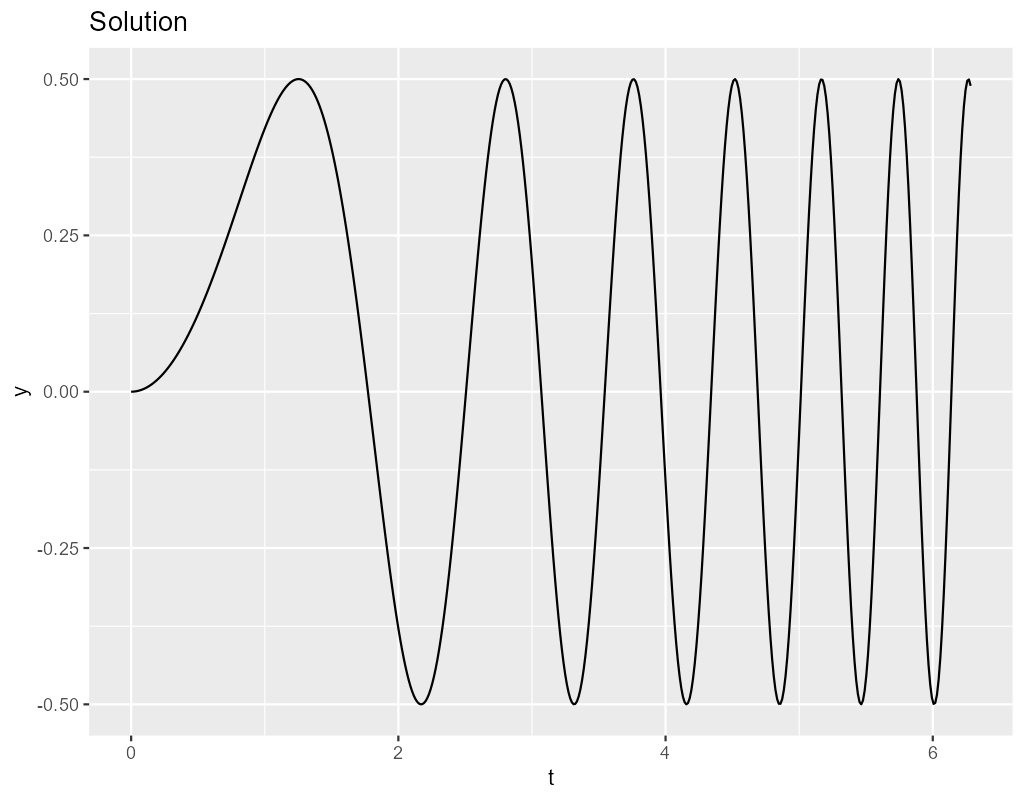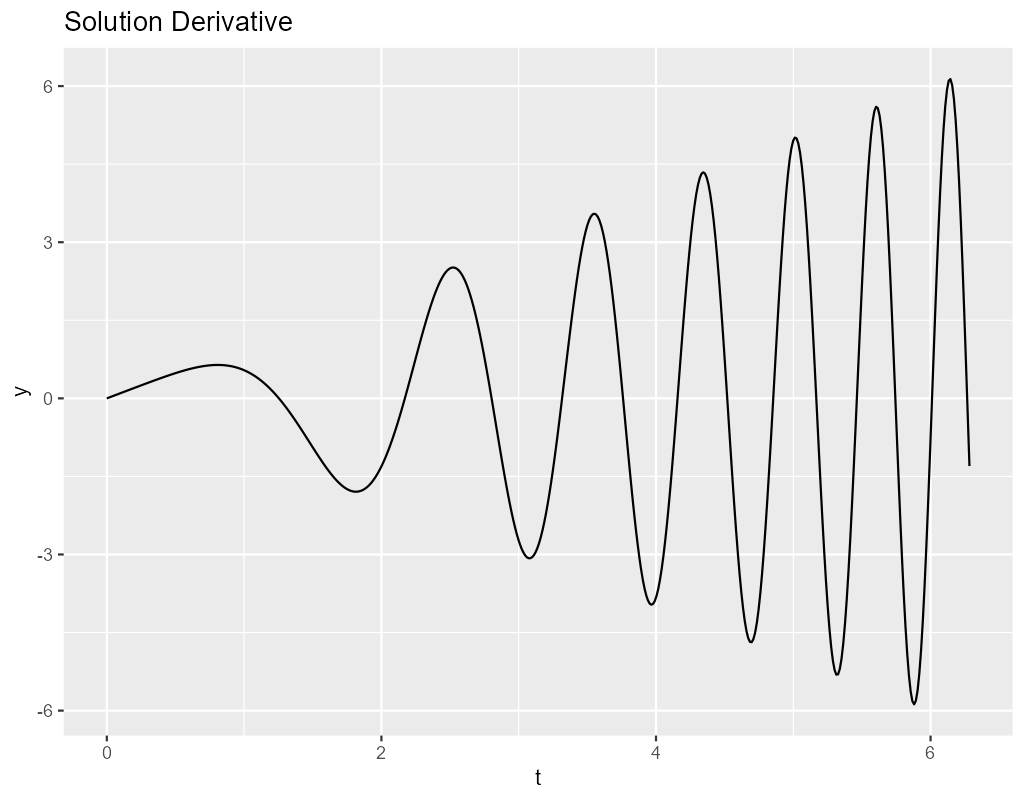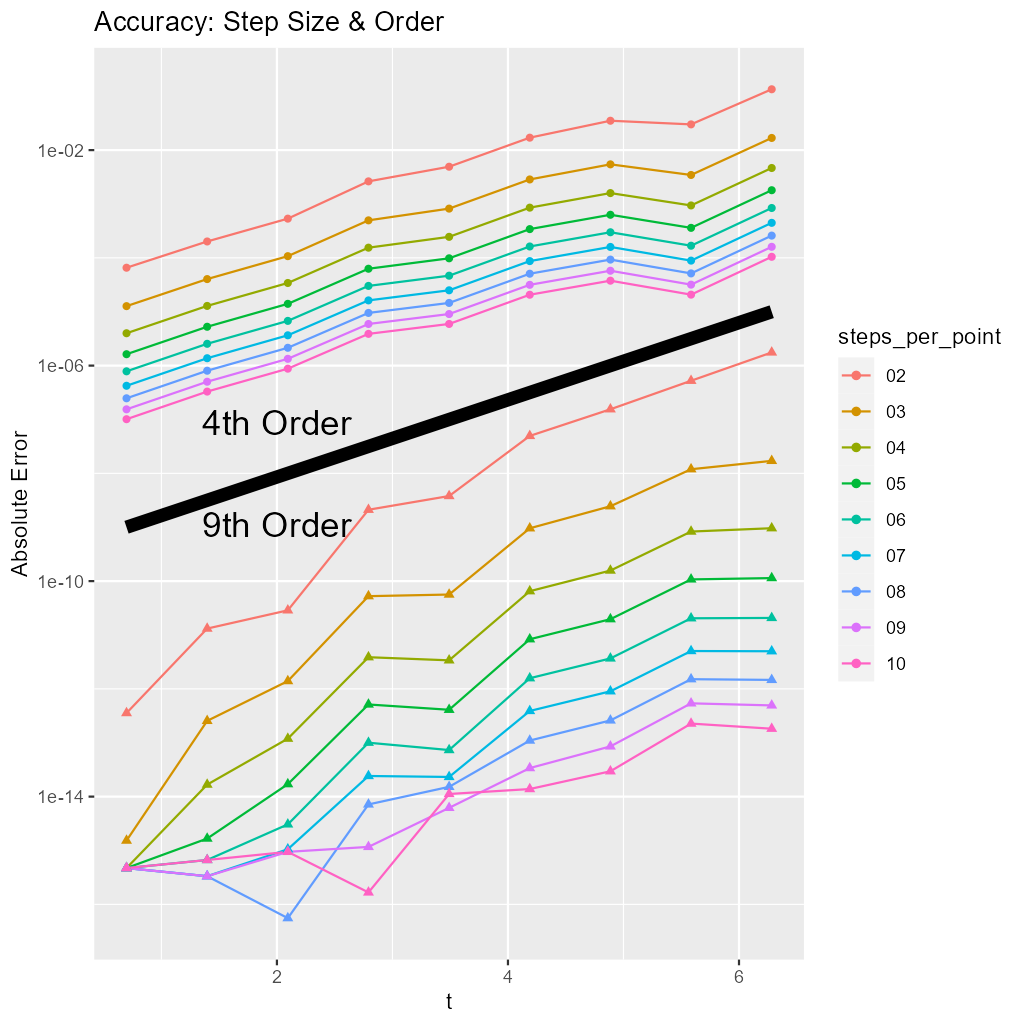Step Size & Order Vs Accuracy
A MRKISS Library Example Program
| Author: | Mitch Richling |
| Updated: | 2025-09-10 16:56:40 |
| Generated: | 2025-09-10 16:56:41 |
Copyright © 2025 Mitch Richling. All rights reserved.
Table of Contents
1. Results
The code for this example is found in examples/step_order_vs_error.f90.
Additionally the code may be found at the end of this document in the section Full Code Listing.
In this example we solve the same equation with two different Runge-Kutta methods – the classical \(\mathcal{O}(4)\) method and a newer \(\mathcal{O}(0)\) method. For each method we use 10 different step sizes.
The system we solve: \[ y'=t\cos(t^2) \,\,\,\mathrm{with}\,\,\, y(0)=0 \]
We can solve this equation symbolically: \[ y'\frac{\sin(t^2)}{2} \]
Here are a copule plots


The system is solved at 10 points, using order 4 and 9 methods with between 1 and 10 steps per point. The impact on accuracy is summarized in the following plot:

2. Full Code Listing
2.1. Fortran Code
program step_order_vs_error use :: mrkiss_config, only: rk, istats_size use :: mrkiss_solvers_wt, only: fixed_t_steps, fixed_t_steps_between use :: mrkiss_utils, only: print_solution, seq use :: mrkiss_erk_kutta_4, only: a4=>a, b4=>b, c4=>c use :: mrkiss_eerk_verner_9_8, only: a9=>a, b9=>b, c9=>c implicit none integer, parameter :: deq_dim = 1 integer, parameter :: num_points = 10 real(kind=rk), parameter :: y_iv(deq_dim) = [0.0_rk] real(kind=rk), parameter :: param(2) = [1.0_rk, 1.0_rk] real(kind=rk), parameter :: pi = 4.0_rk * atan(1.0_rk) real(kind=rk), parameter :: t_start = 0.0_rk real(kind=rk), parameter :: t_end = 2.0_rk * pi real(kind=rk) :: solution(1+2*deq_dim, num_points) integer :: status, istats(istats_size), spp character(len=512) :: filename call seq(status, solution(1,:), from_o=t_start, to_o=t_end) do spp = 1,10 call fixed_t_steps_between(status, istats, solution, eq, y_iv, param, a4, b4, c4, spp) write (filename, '("step_order_vs_error_04_",i2.2,".csv")') spp call print_solution(status, solution, filename_o=trim(filename)) call fixed_t_steps_between(status, istats, solution, eq, y_iv, param, a9, b9, c9, spp) write (filename, '("step_order_vs_error_09_",i2.2,".csv")') spp call print_solution(status, solution, filename_o=trim(filename)) end do contains subroutine eq(status, dydt, t, y, param) integer, intent(out) :: status real(kind=rk), intent(out) :: dydt(:) real(kind=rk), intent(in) :: t real(kind=rk), intent(in) :: y(:) real(kind=rk), intent(in) :: param(:) dydt = [ t * param(1)*cos(param(2) * t * t) ] status = 0 end subroutine eq end program step_order_vs_error
2.2. R Code
The images were produced with R.
crvDat <- data.table(t=seq(0,2*pi, length.out=500)) %>% mutate(truy1=sin(t*t)/2) drvDat <- data.table(t=seq(0,2*pi, length.out=500)) %>% mutate(trudy1=t*cos(t*t)) truDat <- data.table(t=seq(0,2*pi, length.out=10)) %>% transmute(truy1=sin(t*t)/2) solDat <- do.call(rbind, lapply(list.files(pattern = "^step_order_vs_error_[0-9][0-9]_[0-9][0-9]\\.csv$"), function(f) { rko=first(strsplit(f, "[_.]"))[5]; spp=first(strsplit(f, "[_.]"))[6]; cbind(fread(f), truDat) %>% mutate(err=abs(y1-truy1), order=rko, steps_per_point=spp); })) %>% filter(i>1 & steps_per_point!='01') gp <- ggplot(crvDat) + geom_line(aes(x=t, y=truy1)) + labs(title='Solution', x='t', y='y') ggsave(filename='step_order_vs_error_soly.png', plot=gp, width=1024, height=800, units='px', dpi=150) gp <- ggplot(drvDat) + geom_line(aes(x=t, y=trudy1)) + labs(title='Solution Derivative', x='t', y='y') ggsave(filename='step_order_vs_error_sold.png', plot=gp, width=1024, height=800, units='px', dpi=150) gp <- ggplot(solDat) + geom_line( aes(x=t, y=err, shape=order, col=steps_per_point)) + geom_point(aes(x=t, y=err, shape=order, col=steps_per_point)) + annotate("text", x = 2, y = 1e-8, label = "4th Order\n\n9th Order", color = "black", size = 6) + annotate("segment", x = min(solDat$t), xend = max(solDat$t), y = 1e-9, yend = 1e-5, linewidth=3) + scale_y_log10() + labs(title='Accuracy: Step Size & Order', x='t', y='Absolute Error') + guides(shape = "none") print(gp) ggsave(filename='step_order_vs_error_err.png', plot=gp, width=1024, height=1024, units='px', dpi=150)